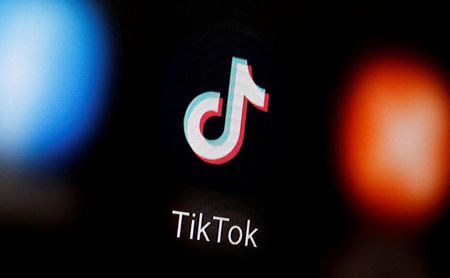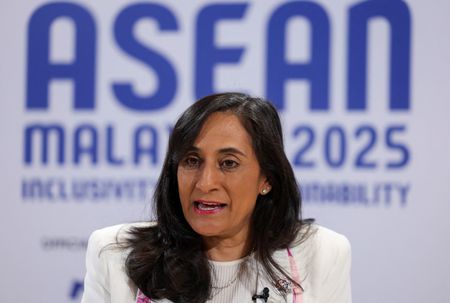BEIJING (Reuters) – Alibaba’s announcement this week that it will partner with Apple to support iPhones’ artificial intelligence services offering in China has again thrust the spotlight on the country’s AI industry on the heels of DeepSeek.
Following are some of the prominent AI services and their developers to watch in China.
DOUBAO
Developed by ByteDance, a latecomer to the large language model (LLM) market, the namesake chatbot is the most popular consumer AI app in China.
The company’s latest LLM, Doubao-1.5-pro, was released in January and outperforms ChatGPT’s GPT-4 in some metrics.
ByteDance is among the leaders in developing cost-effective LLMs, and its offering is the cheapest available in the market, even more affordable than DeepSeek, according to a Barclays report.
Doubao-1.5 was priced at only 3% to 4% of GPT-4’s pricing.
ByteDance’s low-cost advantage is attributed to its use of the “mixture of experts” (MoE) framework, which is common among various AI models in China, including those of DeepSeek.
QWEN
Developed by e-commerce giant Alibaba, Qwen is the company’s flagship LLM and chatbot.
It was released in March 2023 and has been rated among the top-tier in global benchmarks.
In January, Alibaba releasedQwen 2.5-Max and claimed its functionality surpassed that of highly-acclaimed DeepSeek-V3.
A strong advocate of open AI development, Alibaba announced in September that many of its AI models would be made open-source.
ERNIE
Chinese search giant Baidu was among the first in China to launch a ChatGPT equivalent, Ernie Bot.
Baidu claims its latest model, Ernie 4.0, matches the capabilities of GPT-4.
On February 14, Baidu announced a plan to make its next-generation LLM, Ernie 4.5, open-source from June 30, a major shift in strategy as competition heats up.
HUNYUAN
Tencent released its flagship model Hunyuan in September and launched its chatbot, Yuanbao, in May 2024.
The company’s massive user base, acquired through its popular consumer apps like WeChat, gives Tencent a significant potential advantage in pushing out consumer applications in the future.
Tencent also offers open-source models and advocates for open-source development. Another advantage of Hunyuan is its focus on multi-modality, which includes text, image, and video generation capabilities.
GLM
Zhipu AI developed GLM and claims its latest LLM, GLM4, outperforms GPT-4 in some metrics.
Initially born out of a Tsinghua University laboratory, Zhipu counts Alibaba, Tencent, and the state-owned fund Zhongguancun Science City Innovation Development among its backers.
In January, the U.S. Commerce Department placed Zhipu on an export control entity list.
KIMI
It was developed by Moonshot, which is backed by the likes of Alibaba, Tencent, and Hongshan.
Its chatbot Kimi is known for its long-context processing technology and the company claims the model supports two million input tokens, or units of words, for each query.
On January 20, just two days before DeepSeek released the R1 model, Moonshot unveiled its own reasoning model, Kimi 1.5.
MINIMAX
Minimax is a pioneer among Chinese firms in researching the MoE framework and it open-sourced its most advanced model, MiniMax-01, in January.
MiniMax was founded in December 2021, well before the AI craze sparked by the launch of OpenAI’s ChatGPT. It is backed by Alibaba and other prominent investors, including Hongshan, Gaorong Capital, and IDG.
In addition to LLMs, MiniMax has gained recognition for its social consumer apps, such as Takie and Xingye.
01.AI
Similar to DeepSeek, 01.AI has adopted an open-source approach and pioneered the MoE framework.
The company claims that its models are trained with fewer resources and have a cost-effective advantage, achieving the lowest cost level of LLM inference in the industry, 1/40 less than GPT-4’s list price.
Its founder Kai-Fu Lee, a former head of Google China, said recently in a written interview with Reuters that 01.AI has formed a joint partnership with Alibaba to create a lab focused on continuing the development of LLM technologies.
The company is backed by companies like Alibaba and Sinovation Ventures.
BAICHUAN
Baichuan was founded in April 2023 by a team of former executives from the search engine Sogou, including founder and CEO Wang Xiaochuan, who previously served as the CEO of Sogou.
The company gained recognition in June 2023 by becoming the first in China to launch an open-source model.
(This story has been refiled to correct spelling of ‘Doubao,’ in paragraphs 5 and 6)
(Reporting by Liam Mo and Brenda Goh; Editing by Miyoung Kim and Sharon Singleton)










